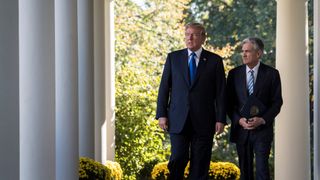Before Donald Trump was elected US president in 2016, there was speculation about his views on monetary and exchange rate policy. While some of his key advisers were advocates of a ‘strong dollar’, Trump’s own mercantilist instincts seemed to favour a weaker exchange rate to promote US export competitiveness, implying a preference for easier monetary policy.
Trump’s early picks to fill vacancies on the Federal Reserve Board of Governors, including Chairman Jerome Powell, were orthodox and reassuring. But Trump has little respect for established institutions or conventions. It was only a matter of time before the Fed would attract the president’s attention.
Whereas previous presidents understood the value of an independent central bank and the dangers of interfering in interest rates and exchange rates, Trump has been pointed in his criticism, not only of Fed policy, but also the monetary policies of other central banks and their implications for the US dollar exchange rate.
It is likely that both US monetary and exchange rate policy will become increasingly politicised under Trump, not least because exchange rate policy is becoming entwined with the president’s trade war with the rest of the world.
His criticisms of Fed policy are not without justification.
His criticisms of Fed policy are not without justification. US inflation expectations, as measured by bond market prices and surveys, have collapsed. The entire US Treasury bond curve now lies below the Fed funds rate, a reliable indicator of impending recession. These market-based indicators imply that US monetary policy is too tight and financial markets are now pricing reductions in US federal funds rate.
Yet the president’s criticisms of the Fed will only make it politically more difficult for the Fed to change course. The Federal Reserve system will resist politicisation and this could distort monetary policy decision-making at a critical time.
Trump has leverage over the Fed through appointments to the Federal Reserve Board. Having declined to reappoint Janet Yellen, there is already speculation Jerome Powell will be looking for another job when his current four-year term as Chairman expires.
Trump has recently nominated Judy Shelton to the Board. Shelton has been a ‘strong dollar’ and gold standard advocate, but more recently has aligned her views with those of the President. Trump has also nominated Christopher Waller, a colleague of St Louis Fed President James Bullard, who has correctly called out the excessively tight stance of US monetary policy.
While Shelton’s views are seemingly inconsistent with Trump's desire for easier monetary policy and a weaker exchange rate, there is nonetheless a deeper affinity between the president’s mercantilist views on trade and Shelton’s Bretton Woods revivalism.
Milton Friedman’s advocacy of floating exchange rates beginning in the early 1950s was a reaction to what he saw as the threat the Bretton Woods system of fixed exchange rates posed to free trade. Friedman noted that the trade and macroeconomics imbalances promoted by fixed exchange rates would inevitably lead countries to pursue protectionist policies to correct them. The collapse of the Bretton Woods system in the early 1970s was a spectacular vindication of Friedman’s view. Friedman laid the intellectual groundwork for the floating exchange rates that have since underpinned global prosperity, not least in Australia since 1983.
Unfortunately, President Trump shows every sign of wanting to return to a system of managed exchange rates. Under his administration, the United States has turned away from its traditional advocacy of floating exchange rates. The draft US-China trade deal reportedly contains an exchange rate chapter which would commit China to maintaining a stable exchange rate, reflecting US concerns China could devalue to neutralise US tariffs. The US-Mexico-Canada Agreement (USMCA) also contains a currency chapter.
The US government has lowered the threshold for declaring other countries guilty of ‘currency manipulation’, while also seeking to make currency ‘undervaluation’ a countervailable subsidy that would attract US tariffs, contrary to World Trade Organization rules. There has been speculation that the US Treasury might intervene in foreign exchange markets independently of the Federal Reserve through its Exchange Stabilisation Fund.
The bigger danger is that the weaponisation of exchange rate policy as part of the trade war ultimately leads to the politicisation of monetary policy and compromises the independence of the Federal Reserve. This would return the United States to the early 1970s, when monetary policy was subordinate to exchange rate and fiscal policy and government resorted to wage and price controls in a futile attempt to contain the resulting macroeconomic chaos.
Milton Friedman devoted much of his life to dismantling managed exchange rates and the economic misery they inflicted on the world. Judy Shelton and Donald Trump are trying to breath new life into failed doctrines.






